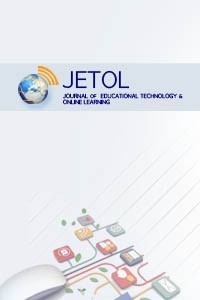Academic engagement experiences of pre-service teachers during the Covid-19 online education process
Academic engagement experiences of pre-service teachers during the Covid-19 online education process
___
- Adak, M. M., & Koç, M. (2022). COVID-19 pandemi döneminde uygulanan uzaktan eğitim sürecinde bilişim teknolojileri öğretmenlerinin deneyimlerinin incelenmesi. Uşak Üniversitesi Eğitim Araştirmalari Dergisi, 8(1), 30-45. https://doi.org/10.29065/usakead.1038646
- Altuntaş Yılmaz, N. (2020). Investigation of students' attitudes towards applied distance education in the covid-19 pandemic process in higher education institutions: Example of physiotherapy and rehabilitation department. Necmettin Erbakan Üniversitesi Sağlık Bilimleri Fakültesi Dergisi, 3(1), 15-20.
- Basilaia, G., & Kvavadze, D. (2020). Transition to online education in schools during a SARS-CoV-2 Coronavirus (COVID-19) pandemic in Georgia. Pedagogical Research, 5(4), em0060. https://doi.org/10.29333/pr/7937
- Bowen, S. (2005). Engaged learning: Are we all on the same page. Peer Review, 7(2), 4–7.
- Chiu, T., Lin, T. J., & Lonka, K. (2021). Motivating online learning: The challenges of COVID-19 and beyond. The Asia-Pacific Education Researcher, 30(3), 187–190. https://doi.org/10.1007/s40299-021-00566-w
- Cohen, L., Manion, L., & Morrison, K. (2007). Research methods in education (6th ed.). Routledge/Taylor & Francis Group.
- Creswell, J. W. (2013). Qualitative inquiry & Research design: Choosing among five approaches (3rd ed.). Thousand Oaks, CA: SAGE.
- Çınar, M., Ekici, M., & Demir, Ö. (2021). A snapshot of the readiness for e-learning among in-service teachers prior to the pandemic-related transition to e-learning in Turkey. Teaching and Teacher Education, 107, Article 103478. doi: 10.1016/j.tate.2021.103478
- Dhawan, S. (2020). Online Learning: A panacea in the time of COVID-19 crisis. Journal of Educational Technology Systems, 49(1), 5–22. https://doi.org/10.1177/0047239520934018
- Erarslan, A. & Arslan, A. (2019). Online learning experiences of university students and the effects of online learning on their learning practices. Language and Technology, 2(1), 44-58.
- Fraenkel, J. R., Wallen, N. E., & Hyun, H. H. (2015). How to design and evaluate research in education (9th ed.). New York: McGraw-Hill Education.
- Frankel, R. M. (1999). Standards of qualitative research. In B.F. Crabtree & W. L. Miller (Eds.) Doing qualitative research (2nd ed.). (pp. 333-346). Thousand Oaks: Sage Publications.
- Görgülü-Arı, A., & Hayır-Kanat, M. (2020). Prospective teacher' views on Covid-19 (Coronavirus). Van Yüzüncü Yıl University the Journal of Social Sciences Institute, Outbreak Diseases Special Issue, 459-492.
- Keskin, S., Çınar, M., & Demir, Ö. (2021). A quantitative content analysis of Turkish state universities’ official websites in terms of their preparedness and actions during emergency distance education in the early phase of the COVID-19 pandemic period. Education and Information Technologies, 1-31. doi: 10.1007/s10639-021-10744-4
- Laksmiwati, P.A., Adams, D., Sulistyawati, E. (2022). Pre-service Teachers’ Readiness and Engagement for Online Learning During the Covid-19 Pandemic: A Rasch Analysis. In: Al-Emran, M., Al-Sharafi, M.A., Al-Kabi, M.N., Shaalan, K. (Eds.). Proceedings of International Conference on Emerging Technologies and Intelligent Systems. ICETIS 2021. Lecture Notes in Networks and Systems, vol 299. Springer, Cham. https://doi.org/10.1007/978-3-030-82616-1_29
- Merriam, S.B. (1998). Qualitative research and case study applications in education. Jossey-Bass Publishers.
- Newmann, F. M., Wehlage, G. G., & Lamborn, S. D. (1992). The significance and sources of student engagement. In F. M. Newmann (Ed.) Student engagement and achievement in American secondary schools (pp.11-39). Teachers College Press.
- Ouweneel, E., Le Blanc, P.M., & Schaufeli, W. B. (2014). On being grateful and kind: Results of two randomized controlled trials on study-related emotions and academic engagement. The Journal of Psychology, 148(1), 37-60. https://doi.org/10.1080/00223980.2012.742854
- Özdoğan, A. Ç., & Berkant, H. G. (2020). The examination of stakeholders’ opinions on distance education during the Covid-19 epidemic. Millî Eğitim, 49(1), 13-43.
- Özer, S., & Turan, E. Z. (2021). Opinions of prospective teachers about distance education due to Covid-19. Turkish Studies - Education, 16(2), 1049-1068. https://dx.doi.org/10.47423/TurkishStudies.48147
- Özüdoğru, G. (2021). Problems faced in distance education during Covid-19 pandemic. Participatory Educational Research, 8(4), 321-333. https://doi.org/10.17275/per.21.92.8.4
- Patton. M. Q. (2002). Qualitative research and evaluation methods (3rd ed.). Sage Publications.
- Pittaway, S. M., & Moss, T. (2014). “Initially, we were just names on a computer screen”: Designing engagement in online teacher education. Australian Journal of Teacher Education, 39(7).
- Redmond, P., Heffernan, A., Abawi, L., Brown, A., & Henderson, R. (2018). An online engagement framework for higher education. Online Learning, 22(1), 183-204. doi:10.24059/olj.v22i1.1175
- Sarı, H. (2020). Evde kal döneminde uzaktan eğitim: Ölçme ve değerlendirmeyi neden karantinaya almamalıyız? Uluslararası Eğitim Araştırmacıları Dergisi, 3(1), 121-128.
- Seyhan, A. (2021). Sosyal bilgiler öğretmen adaylarının covid-19 salgını sürecinde uzaktan eğitim deneyimleri ve görüşleri. Açıköğretim Uygulamaları ve Araştırmaları Dergisi (AUAd), 7(3), 65-93. https://doi.org/10.51948/auad.910385
- Singh, V., & Thurman, A. (2019). How many ways can we define online learning? A systematic literature review of definitions of online learning (1988-2018). American Journal of Distance Education, 33(4), 289-306. https://doi.org/10.1080/08923647.2019.1663082
- Statistics Canada. (2011). Definition of "Academic engagement". https://www150.statcan.gc.ca/n1/pub/81-004-x/2011004/def/academic-academique-eng.htm
- Yıldırım, A., & Şimşek, H. (2011). Sosyal bilimlerde nitel araştırma yöntemleri (8th ed.). Seçkin Yayınevi.
- ISSN: 2618-6586
- Yayın Aralığı: Yılda 3 Sayı
- Başlangıç: 2017
- Yayıncı: Gürhan DURAK
Academic engagement experiences of pre-service teachers during the Covid-19 online education process
Büşra Zeynep ARSLAN, Erva BULUT, Burcu ÖZCAN, Fadime URAL, Funda BARUTÇU YILDIRIM
Online learning and teaching experiences of preservice science teachers during Covid-19 pandemic
Nagihan TANIK ÖNAL, Nezih ÖNAL
Students’ perceptions towards the roles and competencies of online English instructors
Sinem Can ERÇOK GÜLER, Recep CENGIZ, Erkan GÜNAY
A validity and reliability study of the Turkish computational thinking scale
Parent opinions on distance education practices in the emergency remote education period in Turkey
Coding activities in IT courses through the lenses of IT teachers
Seda ADIGÜZEL, Selami ERYILMAZ, Tuğba GENCER, Hüseyin GÖKSU
How Covid-19 taught teachers how to teach online– a case study at the Open University of Mauritius
Social media use among U.S. college students attending a midwestern university
